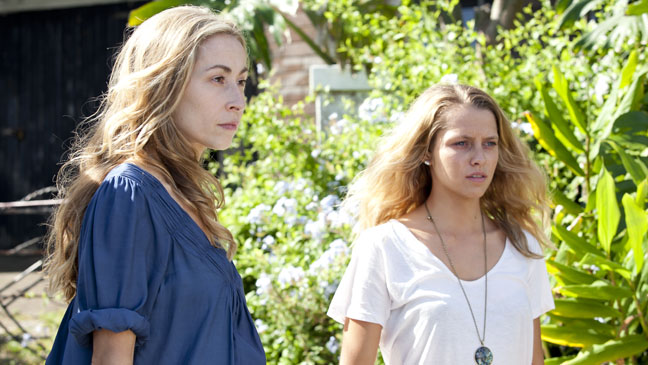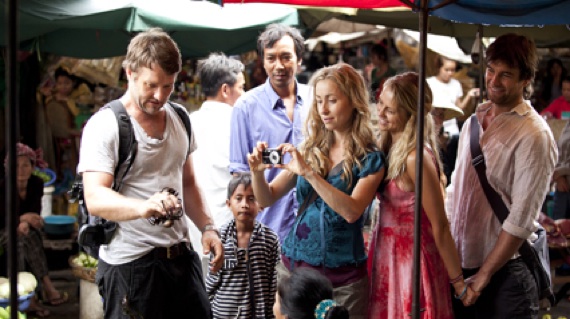|
Wish You Were Here
Reviewed
by
Damien Straker on
April 24th, 2012
Hopscotch presents
a film directed by
Kieran Darcy-Smith
Screenplay
by
Kieran Darcy-Smith and Felicity Price
Starring:
Joel
Edgerton, Felicity Price, Antony Starr and Teresa Palmer
Running
Time:
89 mins
Rating:
MA
Released: April 26th,
2012
|
8/10
|
|
Dave (Joel Edgerton) and his wife Alice
(Felicity Price) are on holidays in Cambodia with her sister Steph
(Teresa
Palmer) and her new boyfriend Jeremy (Antony Starr). They party
together and
even take a number of ecstasy tablets. We see a shot of Dave walking
around,
looking distressed and we suspect he's done something terrible.
Returning back
to their home in Sydney and it is revealed that Jeremy went missing
overseas
and that the others returned home before they could find him. While
trying to
balance their everyday lives with their kids, Dave and Alice are
increasingly
stressed by their attempts to help the police with the investigation
and also
Steph's neediness. There is deep conflict between Dave and his wife
when he admits
that he slept with Steph while they were on holidays. In flashback, we
gradually learn about the traumatic fate of the night that Jeremy went
missing.

Wish
You
Were Here
starts as a minor thriller
but descends into a compelling nightmare, powerfully concerned by
social decay
and the pressures of modern life. The film was written and directed by
Kieran
Darcy-Smith, in collaboration with Felicity Price, and confirms that
Australian
films are untouchable in their representation of a fractured domestic
environment. The division between the domestic and the foreign is
represented
through the contrast of two different worlds. The scenes in Cambodia
take place
on beaches and in the streets at night. They're spatially open and set
to loud
thumping beats on the soundtrack. The night skies are faintly lit up by
red
lights from lanterns and fires. These scenes are organic because the
environment isn't structured by rules or boundaries. Law and order is
regularly
defied. Relationships are broken down, elicit substances are taken and
there
are nastier surprises to be discovered at the back end of the film. By
contrast, the present day scenes are tightly framed to reflect their
highly
ordered nature. They're restricted by physical boundaries made of glass
and
brickwork, and many of the environments like the houses, hospitals and
government buildings are cold and sterile. There is a certain order to
how the
domestic life must be run, with the characters bound by times as they
have to
pick up their kids, go to work and be faithful in their relationships.
There's
a great high angle shot late in the film of Alice sitting in her car in
the
middle of a car park. The height of the shot makes the car seem like a
singular
capsule, caught in the middle of an urban concrete prison. It skilfully
reflects how restrictive contemporary city life can be.

Prior to returning to Sydney, there is a
fascinating scene where Dave wakes up almost caught between the two
worlds. He
appears to be in the wilderness because the area has the look of a
post-apocalyptic environment, with its grey skies,
muted colours, and wild dogs running on
the loose.
By choosing to step back into the domestic zone, the boundaries between
both
worlds are removed, leaving the emotional consequences for Dave's
actions in
Cambodia. From this point we discover that there is genuine skill in
how the
screenplay opts to tell the story. The film is concentrated and the
pacing is
leisurely. It feels much longer than its meager ninety minute running
time.
This is because the secrets of the narrative are exposed gradually
through the
present day scenes and flashbacks to the past. The payoff is thankfully
a
tremendously moving one. Adding further excitement and discussion to
the story
are the more ambiguous touches that are never explained, only hinted
at, like
the nature of Jeremy's business. The film is also strengthened by three
powerful performances. Joel Edgerton is perhaps the best he's ever
been,
visibly traumatised with
guilt and touches of paranoia too
as he desperately tries to hold his family together. Despite its
modesty, the
power of this thriller comes from the naturalistic performances and the
gradual
layers of the story that are revealed. As with a lot of local films it
takes us
fearlessly into dark and challenging places, which is why it is so
haunting and
memorable.
|